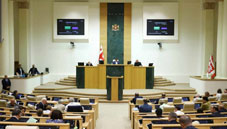
Parliament Overrides President's Veto on Election Code
By Liza Mchedlidze
Tuesday, July 4, 2023
The Parliament reviewed Georgian President Salome Zourabichvili's motivated remarks on the Election Code and successfully overrode the veto.
The President had vetoed the amendments to the election code, which proposed changes to the procedure for electing the chairman and members of the CEC (Central Election Commission).
President Zourabichvili expressed concerns that the requirement of 76 votes for electing the chairman and members would eliminate the need for consensus-based decisions and increase the risk of polarization.
Under the new rule, the responsibility of appointing the CEC chairman and selecting candidates for professional membership was transferred from the President to the Chairman of the Parliament. The required number of votes to support the candidates was also changed, with a majority of the full membership (76 votes) being sufficient for their election. The appointed members would hold their positions for a term of 5 years.
Previously, the election required 100 votes. If a candidate did not receive 100 votes, they would be elected by a majority and serve a term of 6 months. This change was a requirement specified in the April 19 agreement.
As a compromise, the President proposed that the Chairman and members of the CEC be elected by at least 90 votes in Parliament.
Ultimately, the Parliament overcame the veto and voted in favor of the original version of the law, with 78 deputies supporting the decision.
"The Parliament, unfortunately, did not share the President's motivated remarks regarding the election of the Chairman of the Central Election Commission and its non-professional members," said Giorgi Mskhiladze, the Parliamentary Secretary of the President.
According to him, a compromise option was proposed with the mentioned changes, where the number of votes decreased to three-fifths instead of two-thirds, which had already been a precedent in the Parliament of Georgia.
"We did not hear any argument or convincing explanation as to how a compromise decision could be worse than a one-party decision and the appointment of the Chairman of the Central Election Commission. Both the conclusion of the Venice Commission and the interim report of the European Commission indicated that this change should not have been accepted. It could have hindered the implementation of the 12 recommendations that bring Georgia closer to the European Union," Mskhiladze said.

